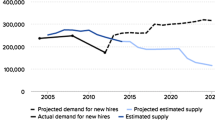Abstract
The present paper uses as a point of departure two of Benton and Hoyt's (1990) survey items concerning undergraduate teaching and their finding that Holmes Group and Division 15 members favored more “sweeping changes” in teacher education whereas TESCSU members favored more “incremental changes.” It: (a) suggests that reform is unlikely to succeed without change in the behavior of those who teach prospective teachers; (b) suggests ways in which educational psychologists can improve the effectiveness of teachers and teacher training; and (c) questions whether moving teacher training to the graduate level will in fact improve such education.
Similar content being viewed by others
References
Anderson, J. R. (1983).The Architecture of Cognition, Harvard University Press, Cambridge, Massachusetts.
Bandura, A. (1986).Social Foundations of Thought and Action: A Social Cognitive Theory, Prentice-Hall, Englewood-Cliffs, New Jersey.
Bandura, A. (1977).Social Learning Theory, Prentice-Hall, Englewood-Cliffs, New Jersey.
Bandura, A., Ross, D., and Ross, S. A. (1963). A comparative test of the status envy, social power, and secondary reinforcement theories of identificatory learning.J. Abnorm. Soc. Psychol. 67: 527–534.
Bandura, A., and Walters, R. H. (1963).Social Learning and Personality Development, Holt, Rinehart, and Winston, New York.
Benton, S. L., and Hoyt, K. B. (1990). Educational reform: Implications for educational psychologistsEducat.Psychol. Rev. 2: 203–236.
Bruner, J. S. (1966).Toward a Theory of Instruction, Harvard University Press, Cambridge, Massachusetts.
Evertson, C. M., and Smylie, M. A. (1987). Research on teaching and classroom processes: Views from two perspectives. In Glover, J. A., and Ronning, R. R. (eds.)Historical Foundations of Educational Psychology, Plenum, New York.
Gibson, J. T., and Chandler, L. A. (1988).Educational Psychology: Mastering Principles and Applications, Allyn & Bacon, Boston.
Gideonse, H. D. (1986). The reduction in teacher-preparation institutions: Rationale and routes. In Galambos, E. C. (ed.),Improving Teacher Education, Jossey-Bass, San Francisco.
Glover, J. A., and Bruning, R. H. (1987).Educational Psychology: Principles and Applications, 2nd ed., Little, Brown, Boston.
Hetherington, E. M., and Frankie, G. (1967). Effects of parental dominance, warmth, and conflict on imitation in children.J. Personal. Soc. Psychol. 6: 119–125.
Issler, K. (1983). A conception of excellence in teaching.Education 103: 338–343.
Ryle, G. (1949).The Concept of Mind, Hutchinson & Co., London.
Squire, L. S. (1986). Mechanisms of memory.Science 232: 1612–1619.
Tulving, E. (1985a). How many memory systems are there?American Psychologist 40: 385–398.
Tulving, E. (1985b). Memory and consciousness.Canad. Psychol. 26: 1–12.
Author information
Authors and Affiliations
Rights and permissions
About this article
Cite this article
Brown, R.T. A “model” proposal for reform in teacher training. Educ Psychol Rev 2, 263–270 (1990). https://doi.org/10.1007/BF01323282
Issue Date:
DOI: https://doi.org/10.1007/BF01323282




